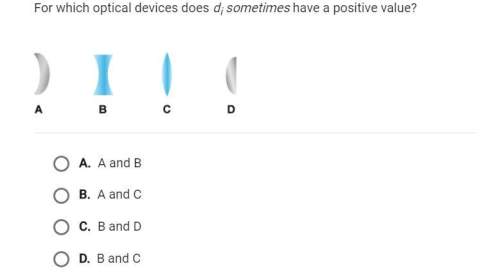
Physics, 06.09.2019 01:20 cami30031cami3003
Galileo used his pulse for the measurement of time. measure the time between your heartbeats after sitting quietly for a few minutes to the nearest 0.1 s. you can obtain that level of precision with an ordinary analog clock by counting several pulses and dividing the elapsed time by the number of pulses. speed is the distance you traveled divided by the time that elapsed while you traveled that distance.
a.)predict your unhurried walking speed. count off 10 steps, counting your heartbeats as you walk, to measure your walking speed in paces per beat and test your prediction.
b.)the length of your step contained some uncertainty when you measured it. your measurement of time contains some uncertainty. use these to estimate how much uncertainty there is in your measurement of your walking speed. report your measurement in meters per second and include uncertainty.

Answers: 3


Another question on Physics

Physics, 22.06.2019 02:20
According to newton’s first law of motion, which force is expected to cause a body to accelerate?
Answers: 1

Physics, 22.06.2019 06:00
An ideal gas is held in a container at constant volume. initially, its temperature is 5 degrees c and its pressure is 1.2 atm. what is its pressure when its temperature is 43 degrees c? answer in units of atm
Answers: 2

Physics, 22.06.2019 09:30
Gasoline comes from petroleum, which is made from ancient living things. petroleum, therefore, contains a type of energy. a. heat b. nuclear c. biological d. chemical potential
Answers: 2

Physics, 22.06.2019 18:20
Wavelength of 125 meters is moving at a speed of 10 m/s. what is it's frequency?
Answers: 1
You know the right answer?
Galileo used his pulse for the measurement of time. measure the time between your heartbeats after s...
Questions

Spanish, 22.04.2020 20:07

Mathematics, 22.04.2020 20:07





Mathematics, 22.04.2020 20:07


Physics, 22.04.2020 20:07




History, 22.04.2020 20:08



Mathematics, 22.04.2020 20:08

History, 22.04.2020 20:08



Mathematics, 22.04.2020 20:08




